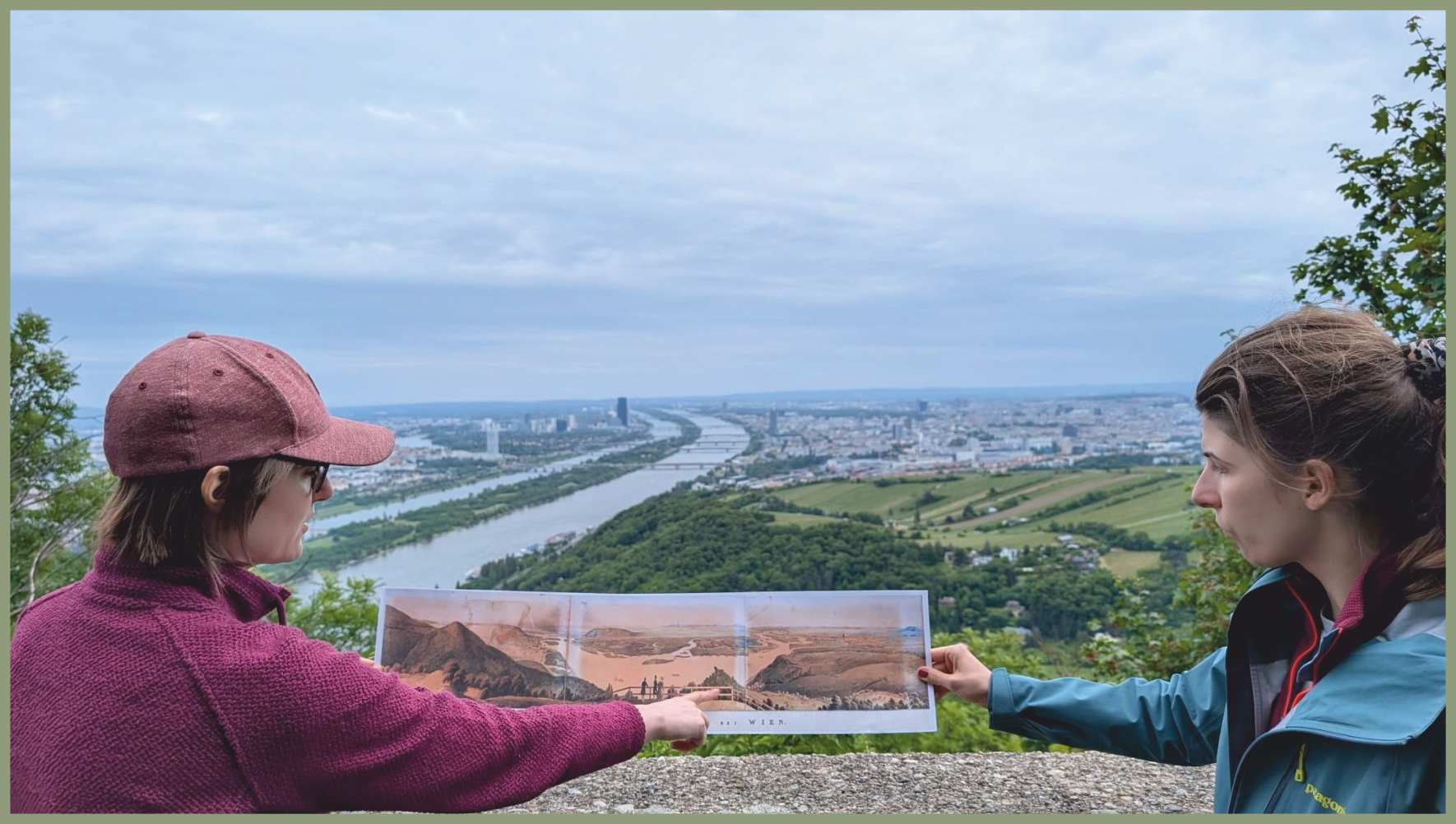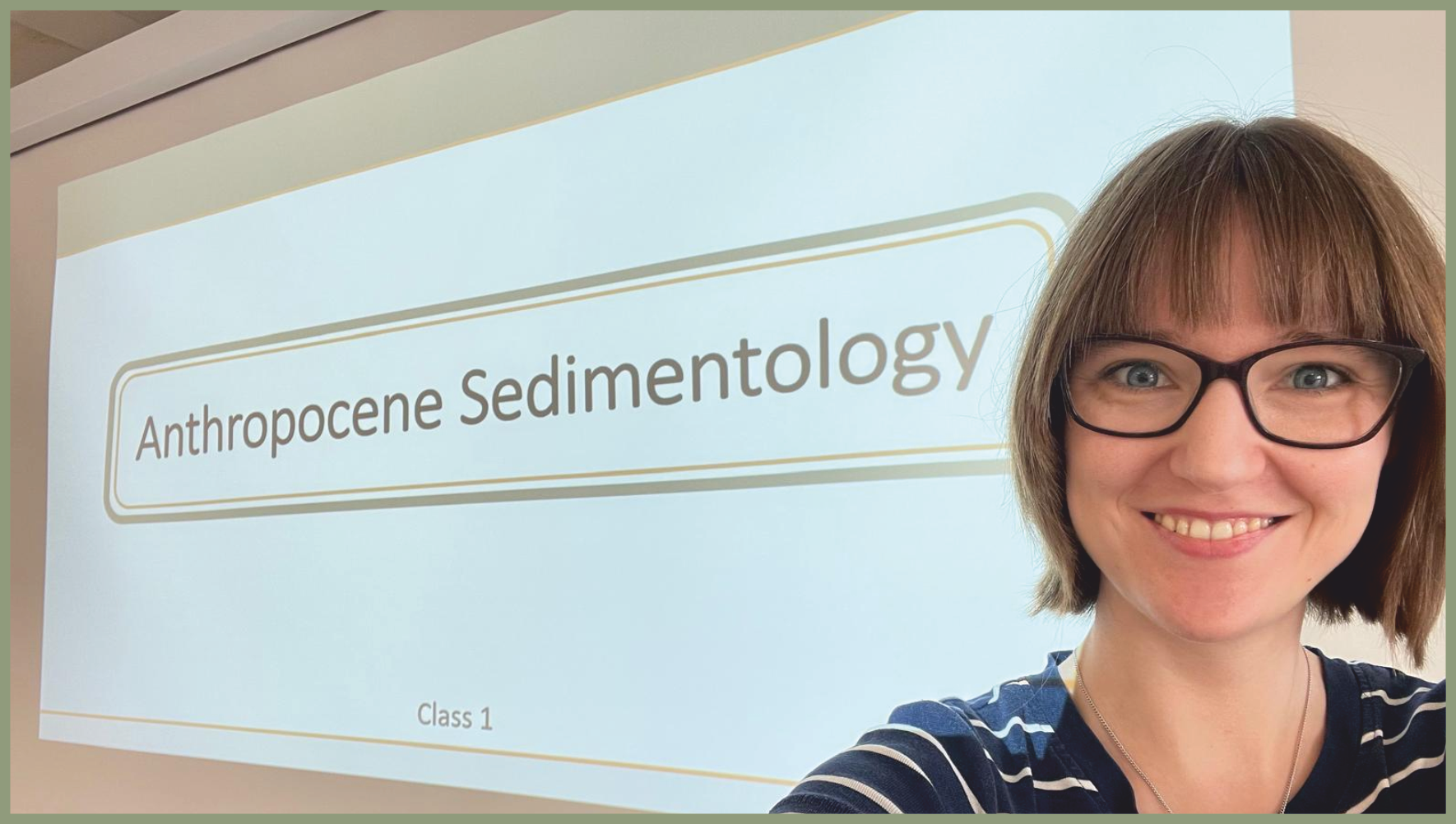Teaching
My teaching philosophy is to nurture students in both their academic learning, and their professional skills development during their higher education journey. To achieve this, I encourage interdisciplinary critical thinking and help them to build their transferable skill sets and become confident, independent learners, hence developing a class of professionals.
Applied Anthropocene Sedimentology
From May – June 2025 I taught “Applied Anthropocene Sedimentology” as a Professor of Applied Anthropocene Sedimentology at Vienna University, which developed on last years course. We explored the intricate ways in which human activities intertwine with natural systems and delve into the dynamic relationship between humans and the environment, with a strong emphasis on practical fieldwork and interdisciplinary methods.
Anthropocene Sedimentology
In April 2024, I taught the first course on “Anthropocene Sedimentology” at Vienna University. The core goal of the course was to provide students with a practical and timely understanding of humanity’s geological footprint, preparing them to address contemporary environmental and technical challenges. My eight-class series explored the journey of traditional and emerging sediments from source to sink, grounded in existing principles from geology and beyond.
Teaching Fellow at the University of Leicester (2018-2021)
I have taught students a range of subjects across all year groups. Courses taught include:
First year:
Introductory Field Course - Isle of Arran: An introduction to geology in the field whereby students are taught good practice and techniques in collection, description, and interpretation of field data, to apply to geological mapping.
Tutorial Workshops: I provided skills sessions to assist 1st years with time management techniques.
Second year:
Depositional Processes and Environments – MODULE COORDINATOR: The physical processes of sedimentation and nature of sedimentary facies in both clastic and carbonate sedimentary environments. I led two coursework assessments and developed the module content during a curriculum overhaul.
Interpreting Geological Maps and Stratigraphy: How to read the rock record through stratigraphic columns and maps. In a series of hands-on practical classes and problem solving, training is provided using published geological maps to infer geological histories involving basin subsidence, orogenic deformation, intrusion, and exhumation.
Third year:
Concepts in Sedimentology and Stratigraphy with Applications to Reservoir Geoscience – COURSE COORDINATOR: The response of sedimentary environments to sea level change, integrated with how hydrocarbon reserves originate, accumulate, and become trapped. I co-developed an innovative coursework approach that consistently received excellent feedback.
Planetary Science: Exploring how geological and geophysical approaches are used to understand the evolution of our own, and neighboring, planets. I taught mapping of surface processes on other planets in context with Martian sedimentology.
Dissertation Supervisor: I provided topical research questions for the students and encouraged them to develop and explore their own ideas so that they could develop the necessary skills for extended scientific work.
Field-based Project Supervisor: Supporting the students in planning, safely executing, and presenting a coherent synthesis of their diverse data sets from the independent field-based projects.
Fourth year (Masters Level):
Advanced Field Course - Sicily, Italy: Advanced geological synthesis and problem-solving skills so that the students could construct a geological transect and demonstrate the geological history of the area with supporting evidence.
Fundamentals of GIS: Explore techniques in GIS through practical experience of using state-of-the-art software, and collect, integrate, and manipulate data from a range of sources to undertake fundamental spatial analysis.
Masters Research Project Supervisor: I provided topical research questions that provide a framework for students to undertake analyses on a subject of interest. I organized placement opportunities where possible and encouraged students to attend conferences and apply for student grants. For BSRG 2019, both of my supervisees were successful in attaining SEPM travel grants to attend. At BSRG 2020, one of my supervisees achieved an Honorable Mention for their poster.
Skills Sessions
I have voluntarily developed teaching materials for professional training workshops for ten years that I deliver alongside formal teaching or as separate training sessions:
Writing essays in exam conditions – (Delivered as part of the second-year module “Depositional Processes and Environments” where students sit essay-style examinations for the first time in their degree (2018-2021)): Encourages students to develop essay structure under time restrictions and appropriate their revision techniques accordingly.
Time management – (Delivered as a first-year tutorial session (2019 and 2020)): Provided techniques and philosophies to students to help them manage both their university assignments and personal engagements.
Networking - (Delivered at departmental Careers Days at both the Universities of Leicester (2013, 2014) and Leeds (2014, 2015); to the undergraduates preparing to attend the British Conference of Undergraduate Research (BCUR) from the University of Leeds, (2015, 2016); to Masters students in the School of Earth and Environment at Leeds in geophysics (2015), structural (2015), and sustainability (2015, 2016); to final year students in the School of Geography, Geology, and the Environment at the University of Leicester preparing to attend their first conference (2017-2020): Aims to boost confidence of students and provide them with skills to help them to be proactive in building a professional network at events and online via social media.
Public Speaking - (Delivered at Skills Conferences at Leeds Student Union (2016-2017); delivered as seminar-style workshop tutorials for PhD students in the STRAT research group at Leeds; for Masters students and PhD students at Leicester as required (2015-2020)): Techniques to improve overall technique of public speaking and confidence.
Preparing conference presentations - (Delivered to the undergraduates preparing to attend the British Conference of Undergraduate Research (BCUR) from the University of Leeds; to PhD students in the STRAT research group in preparation for BSRG 2016; to Masters students preparing for their first conferences 2017-2020): Techniques for drawing a story from a research project and constructing a talk, or poster presentation, around its key objectives.
Quiet networking - (Delivered through the University of Leeds Careers Centre and tailored for PhD students (2015, 2016)): Provides techniques to encourage confidence for introverted PhD students so they can network better.
Chairing and facilitating - (Delivered at Skills Conferences at Leeds Student Union (2016-2017)): How to organize and lead a committee meeting; critical thinking exercises in identifying the problem in complex issues.
Confident communication for international students – (A one-off workshop requested by students via the Leeds Student Union (2017)): The workshop progressed from one-on-one networking to public speaking over two hours.
Supervision Roles
Doctoral dissertations
2024-present: Diana Hatzenbühler (informal), Universität Wien, “Anthropocene stratigraphic signals”
2021-present: Roodra Manogaran, Louisiana State University, “Paleohydrology, Geomorphology, and Sedimentary Architecture of Inverted Channels in the Martian Equatorial Zone“.
2021-2025: Marie Marsden, [CENTA: Collaboration with the University of Birmingham, British Geological Survey, the Natural History Museum, and RPS Group] “Stratigraphy and dinosaur paleontology of the Wealden Group, Isle of Wight”.
2018-2025: Alice Fugagnoli, University of Leicester, “Plastic, a new anthropogenic component of the geological cycle: its chemical and physical behavior and transformation”.
2020-2023: Daniel Lopez Louisiana State University, ”Seepage-induced pore pressure variations beneath an earthen levee”.
2016-2023: Yasmin Yonan, University of Leicester, “The controls on the vertical distribution of microplastics in sediment”.
Masters theses
2020-2021: Charlotte Dykes - Fabrics to fibers: understanding how textiles add to environmental microplastics through laboratory experiments (1st Class)
2020-2021: James Hardwick – Understanding the relationship between root depth and river stability (1st Class and highest grade in the year, for which he was awarded a prize)
2020-2021: Tom Snaith – [Collaboration with the Haus der Kulturen der Welt, Germany, and Augsburg University, USA] Investigating distribution of microplastic pollution in the lower Mississippi River (1st Class)
2019-2021: Connor Burchell – [Collaboration with the University of Hull] Investigating the hydrodynamic properties of meso- and macroplastics (1st Class)
2019-2020: Anthony Morgan – [Collaboration with RPS Group] A sedimentological analysis of floodplain successions in the Wealden Formation, Isle of Wight (2:1 Upper Division)
2019-2020: Jasmine Lycett – Understanding how microfibers shed during a washing cycle (2:1 Lower Division)
2018-2019: Thomas Goldring – [Collaboration with RPS Group] Sedimentology of the Wealden Formation, Isle of Wight (2:1 Lower Division)
2017-2018: William Crabbe – Paleoenvironmental Reconstruction of the Terminal Ediacaran Kotlin Formation from Estonia and Russia through Microfacies and Paleontological Analysis (1st Class)








